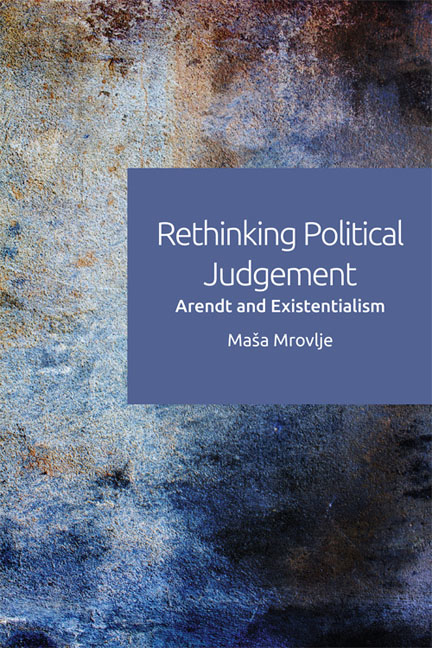Book contents
- Frontmatter
- Contents
- Acknowledgements
- Introduction
- 1 Political Judgement in the History of Political Thought and the Modern Crisis
- 2 Sartre and Beauvoir: The Ambiguity of Political Judgement and the Challenge of Freedom and Responsibility
- 3 Camus and Arendt: Confronting the Ambiguity of Political Judgement and Illuminating the Limits of the World
- 4 Political Judgement and Narrativity
- 5 Facing Up to the Tragedy of Political Action: The Problem of Dirty Hands
- 6 Times of Transition: Reconciling with the Tragic Nature of Political Affairs
- Conclusion: Reclaiming Wonder at the World of Political Affairs
- Bibliography
- Index
Conclusion: Reclaiming Wonder at the World of Political Affairs
- Frontmatter
- Contents
- Acknowledgements
- Introduction
- 1 Political Judgement in the History of Political Thought and the Modern Crisis
- 2 Sartre and Beauvoir: The Ambiguity of Political Judgement and the Challenge of Freedom and Responsibility
- 3 Camus and Arendt: Confronting the Ambiguity of Political Judgement and Illuminating the Limits of the World
- 4 Political Judgement and Narrativity
- 5 Facing Up to the Tragedy of Political Action: The Problem of Dirty Hands
- 6 Times of Transition: Reconciling with the Tragic Nature of Political Affairs
- Conclusion: Reclaiming Wonder at the World of Political Affairs
- Bibliography
- Index
Summary
Follow, poet, follow right
To the bottom of the night,
With your unconstraining voice
Still persuade us to rejoice;
With the farming of a verse
Make a vineyard of the curse,
Sing of human unsuccess
In a rapture of distress;
In the deserts of the heart
Let the healing fountain start,
In the prison of his days
Teach the free man how to praise.
W. H. Auden, ‘In Memory of W. B. Yeats’This book has sought to enrich current debates about the importance and perplexity of political judgement by evoking the voice of twentieth-century philosophies of existence. Drawing on their aesthetic sensibility, it has undertaken a so far neglected enquiry into the experiential reality, and the accompanying ambiguity, of judgement. Departing from the rationalist quest for valid standards and rules, the four thinkers revealed the significance of judgement as a paramount political ability. For it is by delving into the situated process of judging that their narrative orientation pointed to the ways of enhancing our ability to recognise and respond to the context-specific uncertainties that elude the order of final solutions. From their recognition that we are not ‘all-knowing immortals’ but ‘flurried humans’, also sprung an appeal to the specifically human powers of facing up to the challenges of our imperfect, alltoo-human world – an entreaty to ‘the peculiar value and beauty of choosing humanly well’ (Nussbaum 1998: 142).
Reclaiming the challenge and promise of judging for the world, the four thinkers address a problem of pressing relevance for political thought. The manifest inadequacy of abstract rules to capture the perplexities of our plural world, as Linda Zerilli (2016: 1) has recently argued, foregrounds the human capacity for reflective judgement as ‘a central feature of modern democratic citizenship’. Yet the current awareness of the irreversible loss of reliable standards is also tainted by a persistent suspicion that, in the absence of universal rules, we may not be able to judge at all. If current attempts to revivify political judgement as a practice of public reason are plagued by a residual rationalism, their critics tend to view political judgement as expression of the preconscious, somatically and socially shaped workings of affect (Zerilli 2016: 2–6).
- Type
- Chapter
- Information
- Rethinking Political JudgementArendt and Existentialism, pp. 218 - 225Publisher: Edinburgh University PressPrint publication year: 2017

